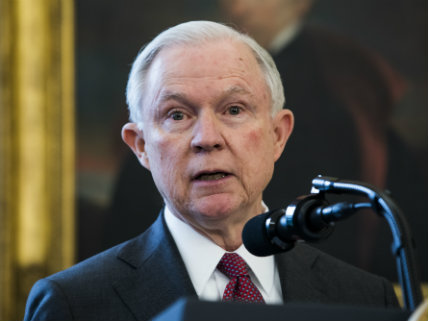Sessions Scraps Commission on Forensic Science Standards
Say goodbye to an independent panel trying to keep bad science out of courtrooms

U.S. Attorney General Jeff Sessions will disband a commission dedicated to reviewing forensic science standards, raising concerns from some members of the commission that bad science will continue to make its way into courtrooms and innocent people will continue to go to jail.
Sessions announced in a statement Monday that the Justice Department will not renew the charter of the National Commission on Forensic Science, an independent panel of scientists, law enforcement, judges, and defense attorneys created by the Obama administration in 2013 to review the reliability of forensic science used in trials.
In its place, Sessions will appoint a yet-to-be named senior forensics advisor to the Justice Department. A subcommittee of a Justice Department task force on violent crime—part of President Trump's so-called "law and order" efforts—will also study the issue. The department is also opening up a public comment period for recommendations on future forensic science efforts.
"The availability of prompt and accurate forensic science analysis to our law enforcement officers and prosecutors is critical to integrity in law enforcement, reducing violent crime and increasing public safety," Sessions said in a press release Monday. "As we decide how to move forward, we bear in mind that the Department is just one piece of the larger criminal justice system and that the vast majority of forensic science is practiced by state and local forensic laboratories and is used by state and local prosecutors."
The announcement came as the commission was holding its final scheduled meeting, where Keith Harward, who spent 33 years in Virginia state prison for rape and murder before being exonerated by DNA evidence, testified.
A jury convicted Harward, then a Navy sailor, of the 1982 murder of a Newport News, Va. man and the rape of his wife. Harward's conviction was based largely on the testimony of two forensic dentistry "experts," who said bite marks on the victim's legs matched Harward's dental record. Decades later, DNA testing of the rape kit in the case produced a single match: one of Harward's fellow sailors, who in the meantime had been convicted of an unrelated kidnapping and died in an Ohio prison.
"The important victims of this," Harward said at the commission hearing, his voice breaking, "were my parents. The only time I ever saw my father cry was when he was up there begging for my life. I was spared the death penalty. My parents were not. Every day they had to deal with it, and it killed them. Just because these odontologists made up stuff to stroke their egos and get a conviction."
DNA testing has resulted in nearly 350 post-conviction exonerations like Harward's since 1989, according to the National Registry of Exonerations. There have been more than 2,000 exonerations overall since then. Those numbers have raised serious concerns about the validity of many commonly used forensic methods, and several crime lab scandals have also called into question professional standards and ethics among the expert witnesses put on the stand by prosecutors.
Six leading scientists at the commission wrote a letter last Thursday urging Sessions not to disband the commission, writing that "for too long, decisions regarding forensic science have been made without the input of the research science community."
Criminal defense groups and forensic science advocates have long called for crime labs to be made independent from law enforcement, saying the arrangement is an inherent conflict of interest. In a statement, National Association of Criminal Defense Lawyers president Barry Pollack said his organization was "terribly disappointed" in the decision.
"The reliance of law enforcement on questionable science and the overstatement of the reliability of that science has been a leading cause of the wrongful conviction of innocent people," said National Association of Criminal Defense Lawyers (NACDL) President Barry J. Pollack. "The reason the National Commission on Forensic Science has been so important is that it includes leading independent scientists, allowing an unbiased expert evaluation of which techniques are scientifically valid and which are not."
Sessions' move is yet another departure from the Obama administration, although even under Obama, the Justice Department was resistant to calls for changes that would have limited several widely used forensic methods.
Under former Attorney General Loretta Lynch, the Justice Department rejected recommendations by a White House science council last September to require expert witnesses to disclose error rates in their testimony and, where methods haven't been scientifically verified, not use them at all. The President's Council of Advisors on Science report found that reviews of several commonly used forensic methods such as analysis of hair, bitemarks, and shoe-prints "have revealed a dismaying frequency of instances of use of forensic evidence that do not pass an objective test of scientific validity." In the case of bite mark evidence, the report stated that "available scientific evidence strongly suggests that examiners not only cannot identify the source of bite mark with reasonable accuracy, they cannot even consistently agree on whether an injury is a human bite mark."
The Washington Post also reported Monday that the Justice Department is also suspending a wide, ongoing review of forensic testimony. The review was launched after the Justice Department and FBI admitted in 2015 that two dozen examiners in one of its forensics labs had given flawed testimony in hundreds of cases.
Bite mark evidence is still regularly admitted in courts across the U.S., and has yet to be barred from any court. Harward is at least the 25th person to be exonerated after being convicted based on bite mark evidence, according to The Innocence Project, which works to identify and exonerate wrongly convicted inmates.
"It's not right. Why's it still around?" Harward said of bite mark evidence. "Just this year there's been two people, like me, who've gotten out. Explain to me, what does it take to admit that this stuff's all crap?"


Show Comments (21)